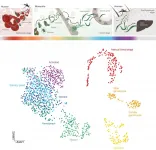Mathematical model developed to prevent botulism
2021-05-27
(Press-News.org) For years, food producers who make lightly preserved, ready-to-eat food have had to follow a set of guidelines to stop growth of Clostridium botulinum bacteria and production of a strong neurotoxin. The toxin can cause a serious illness called botulism.
For refrigerated products, the guidelines for controlling Clostridium botulinum indicate that the water contained in the products should have a salt content of at least 3.5%. Unfortunately, this hampers efforts to develop salt-reduced products, even though such products would benefit public health, as most consumers eat more salt than recommended.
If food producers want to launch products that contain e.g. less salt, they have had to conduct laboratory experiments to document that such a change in recipe will not compromise food safety. This is a time-consuming and costly process.
Reduced need for costly product testing
Researchers at the National Food Institute have now developed a mathematical model, which replaces costly laboratory experiments. The industry has been asking for this model for years. The new model can predict whether a particular recipe for chilled products can prevent the growth of Clostridium botulinum and production of the toxin.
The model is the most comprehensive of its kind in the world and can show how storage temperature, pH, salt and the use of five different preservatives (such as acetic and lactic acids) affect potential bacterial growth and production of the toxin. Previous models have only incorporated the effect of half of these factors.
The model was originally developed for use in fish products. However, by conducting validation studies using more than 500 different products, the researchers have established that it can be used to assess the safety of recipes for both fish and poultry.
Future work on the model will include other foods such as meat and vegetable products.
Major interest from the industry
The researchers have described their work with development of the new model in a newly published article in the International Journal of Food Microbiology. Because of this, several large food producers have already contacted the National Food Institute with a view to having the safety of their recipes tested using the model.
The next step is to include the new Clostridium botulinum model in the institute's Food Spoilage and Safety Predictor (FSSP) software in order to make it more user-friendly.
The FSSP programme already contains a number of models that can predict the growth of disease-causing microorganisms such as Listeria monocytogenes as well as some spoilage bacteria. FSSP is used by food producers all over the world to promote product development and to document food safety and shelf life.
Laboratory experiments using less dangerous bacteria
When conducting experiments using Clostridium botulinum bacteria, strict safety measures must be adhered to in the laboratory, as their toxins can cause serious illness that can lead to death.
During their work to create the new model, the researchers have used Clostridium botulinum isolates, which cannot form the dangerous toxins but are still useful for predicting the absence of growth and thereby absence of toxin formation in different recipes. The use of these bacteria has made laboratory work considerably less cumbersome.
INFORMATION:
Read more
Read more in the article: Cardinal parameter growth and growth boundary model for non-proteolytic Clostridium botulinum - Effect of eight environmental factors.
Since the FSSP programme was introduced in 1999 more than 17,000 people from companies, institutions and authorities in more than 100 countries have used it. The programme was developed by Professor Paw Dalgaard at the National Food Institute and is freely available. Read more about the programme on the FSSP's website.
Contact
PhD student Ioulia Koukou, ioko@food.dtu.dk
Professor Paw Dalgaard, pada@food.dtu.dk, tlf. +45 45 25 25 66
ELSE PRESS RELEASES FROM THIS DATE:
2021-05-27
Current neural network algorithms produce impressive results that help solve an incredible number of problems. However, the electronic devices used to run these algorithms still require too much processing power. These artificial intelligence (AI) systems simply cannot compete with an actual brain when it comes to processing sensory information or interactions with the environment in real time.
Neuromorphic chip detects high-frequency oscillations
Neuromorphic engineering is a promising new approach that bridges the gap between artificial and natural intelligence. An interdisciplinary research team at the University of Zurich, the ETH Zurich, and the ...
2021-05-27
What keeps consumers hooked on high sugar soft drink? Advertising, of course. But why are some consumers more adept at ignoring these cues than others?
A new study from Flinders University, published in Appetite, found participants with an automatic bias towards soft drinks - or difficulty resisting sweet drinks compared to non-sweetened control beverages (e.g., water) - were more responsive to the ads than those without these tendencies.
The Australian study compared the ability of 127 university-age students (18-25 year olds) to withstand or succumb to the urge to reach for a soft drink when viewing television advertisements.
"Perhaps, then, we can start targeting people who show these ...
2021-05-27
Analysis using a national medical database revealed that the cumulative incidence of autism spectrum disorders (ASD) in children born in 2009-2014 was 2.75% by the age of five. A research group led by Associate Professor Daimei Sasayama and Professor Hideo Honda of the Department of Child and Adolescent Development Psychiatry, Shinshu University School of Medicine, used a national medical database to analyze autism spectrum disorders in Japan. It was reported that the cumulative incidence showed an increasing trend for each year of birth, and that there were regional differences.
This cumulative incidence of ASD is the highest in the world based on medical diagnosis, suggesting high diagnostic ...
2021-05-27
Poor sleep impacts the risk of long-term cognitive decline in Hispanic/Latino middle aged and older adults differently than it does in non-Hispanic adults, according to research led by University of Miami Miller School of Medicine neurology faculty and the largest long-term study of U.S. Hispanic/Latinos to date.
During seven years of follow-up, Hispanics/Latinos were more likely to develop cognitive declines in processing speed, mental flexibility, and verbal memory, if they had sleep disordered breathing, such as obstructive sleep apnea, and long sleep duration of nine or more hours. The risk was especially high in middle-aged adults without metabolic syndrome and women without obesity or metabolic syndrome ...
2021-05-27
Oysters' exposure to plastics is concerning, particularly because these materials can accumulate and release metals which are then absorbed by the molluscs. According to a recent study published in the journal Chemosphere, the combined presence of nanoplastics and arsenic affects the biological functions of oysters. This study was conducted by the Institut national de la recherche scientifique (INRS) in Québec City and the French National Centre for Scientific Research (CNRS) at the University of Bordeaux in France.
The international research team chose to study arsenic, since it is one of the most common metals absorbed ...
2021-05-27
PULLMAN, Wash. - For decades, wealthy nations have transported plastic trash, and the environmental problems that go with it, to poorer countries, but researchers have found a potential bright side to this seemingly unequal trade: plastic waste may provide an economic boon for the lower-income countries.
In a study published in the Journal of World Systems Research, Yikang Bai of Washington State University and Jennifer Givens of Utah State University analyzed 11 years of data on the global plastics trade against economic measures for 85 countries. They found that the import of plastic waste was associated with growth in gross domestic product per capita in the lower-income countries.
"Our study offers a nuanced understanding of the global trade in plastic waste," said Bai, ...
2021-05-27
DALLAS, May 27, 2021 -- Adults who have obsessive-compulsive disorder (OCD) were more than three times as likely to have an ischemic stroke later in life compared to adults who do not have OCD, according to new research published today in Stroke, a journal of the American Stroke Association, a division of the American Heart Association.
"The results of our study should encourage people with OCD to maintain a healthy lifestyle, such as quitting or not smoking, getting regular physical activity and managing a healthy weight to avoid stroke-related risk factors," said study senior author Ya-Mei Bai, M.D., Ph.D., a professor in the department of psychiatry at Taipei Veterans General Hospital ...
2021-05-27
Researchers have mapped in fine detail the genetic changes malaria parasites go through as they prepare to infect people.
The atlas maps the malaria parasite Plasmodium falciparum in unprecedented cellular detail as it develops inside a mosquito and prepares to infect humans through a bite. This detailed investigation could lead to new ways to block key stages in the parasite's development and prevent transmission through future drugs or vaccines.
Mosquitoes are increasingly resistant to pesticides, and the parasite that causes malaria is also becoming increasingly ...
2021-05-27
A cutting-edge digital tool that will make it cheaper, safer and faster for pharmaceutical companies to predict protein stability - a vital step in the development of new medicines - is being rolled out by scientists from the UK's University of Bath through their spin-out company, BLOC Labs.
The tool, launched this week, will help researchers identify the most promising protein molecules for drug development. It has the potential to play an important role in the creation of monoclonal antibodies (mAbs). The market for these therapeutic antibodies is worth over £70 bn.
Monoclonal antibodies are a type of protein derived from natural antibodies and then refined and mass produced in the lab. They are steadily transforming the way we treat and prevent diseases, from ...
2021-05-27
Nearly three years after the Trump administration's "Zero Tolerance" policy went into effect, more than 445 children remain separated from their families, largely due to insufficient identifying paperwork and U.S. immigration officials' failures to plan, track and reunite separated families. In a Policy Forum, Elizabeth Barnert and colleagues - an interdisciplinary group of physicians, scientists and human rights advocates - argue that a well-defined, replicable, scalable, and sustainable framework to collect and manage sensitive DNA data is urgently needed in order to play a part in helping reunite separated migrant families safely and ethically. ...
LAST 30 PRESS RELEASES:
[Press-News.org] Mathematical model developed to prevent botulism


